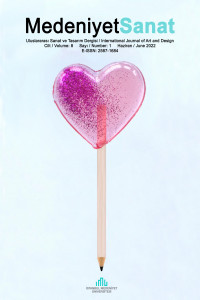Kral Lear'da Babalar ve Çocukları
William Shakespeare, Kral Lear (1605) oyununda; Hristiyanlık öncesi dönem Britanya krallarından Lear’ın tarihsel öyküsünü, kendi yorumuyla ele almaktadır. Oyunda Kral Lear, ülkesini üç kızı arasında adaletsiz bir şekilde paylaştırır ve bu trajik hatası Lear’ı, hem kızlarıyla hem de doğayla giriştiği hesaplaşmada deliliğe ve ölüme sürükleyecek olan süreci başlatır. Shakespeare, bu anlatıya ek olarak, Gloucester ve iki oğlunun öyküsünü, Lear ve kızlarınınkine paralel, oyun içi bir alt öykü (sub-plot) olarak kurguya yerleştirmektedir. Yanı sıra, yapının merkezinde yer alan “doğa” kavramı; tüm karakler üzerinde direkt etki sahibi olup, adeta karakterleşmiş başka bir baba figürüne işaret etmekte ve üst bir öykü katmanını daha doğurmaktadır.Bu çalışma; Kral Lear oyunundaki Lear ve Gloucester karakterlerini hem çocuklarıyla hem de kendi babaları sayabileceğimiz doğa (tanrılar) ile ilişkileri içinde ele almaktadır. Oyunun sahip olduğu, çok katmanlı ve eş zamanlı gelişen öykü yapısı bu izlek içinde incelenmekte, oyunun sahip olduğu grotesk ve absürt ögelerse bu ilişki üzerinden analiz edilmeye çalışılmaktadır.
Anahtar Kelimeler:
Tiyatro, Dramaturji, Sahne Sanatları, Shakespeare, Kral Lear
Fathers and Children in King Lear
William Shakespeare handles the historical story of Lear, one of the British kings of pre-Christian era, with his own interpretation in King Lear (1605). King Lear unfairly divides his country among his three daughters, and this tragic mistake initiates the process of him settling a score both with his daughters and the nature, which eventually leads him to madness and death. In addition to this narrative, Shakespeare embeds the stories of Gloucester and his two sons into the text as a sub-plot in parallel with Lear and his daughters. Furthermore, the notion of nature which is located at the center of the narrative and which has a direct impact on all of the characters points out another father figure that has been almost characterized, and gives birth to a superstratum of the story.This reading discusses Lear and Gloucester characters in King Lear in their relations with both their children and nature (gods) which we can consider as their fathers. Multi-layered and concurrent narrative structure is reviewed within this theme, and the grotesque and absurd elements in the play are tried to be analyzed in terms of such relation.
Keywords:
Theatre, Dramaturgy, Performing Arts, Shakespeare, King Lear,
___
- Bate, J. (2001). Shakespeare’s foolosphy [Shakespeare’in Delifelsefesi]. Shakespeare in Southern Africa, 13(1), 1-10.
- Chambers, E. (1964). Shakespeare: A Survey. England: Pelican Books.
- Eagleton, T. (2005). William Shakespeare (C. Yalaz, Çev.). İstanbul: Boğaziçi Üniversitesi Yayınevi.
- Gilbert, S., Gubar, S. (2000). The Mad Woman in The Attic: The Women Writer and The Nineteenth Century Literary Imagination. ABD: Yale university Press.
- Halio, J. L. (2005). The Tragedy of King Lear. England: Cambridge University Press.
- Honan, P. (2003). Shakespeare: Bir Yaşam (B. Bozkurt, Çev.). İstanbul: Yapı Kredi Yayınları.
- Jesus, L. (2012). A Study of Fools: Lear’s Fool in Shakespeare’s King Lear and Vladimir and Estragon in Beckett’s Waiting for Godot. Yüksek Lisans tezi. Federal University of Rio Grande do Sul, Rio.
- Kott, J. (1999). Çağdaşımız Shakespeare (T. Güney, Çev.). İstanbul: Mitos Boyut Yayınları.
- Mentz, S. (2010). Strange Weather in King Lear [Kral Lear’da Tuhaf Hava Durumu]. Shakespeare, 6(2), 139-152.
- Nutku, Ö. (1995). Shakespeare Oyunları Üzerine bir İnceleme. İstanbul: Mitos Boyut Yayınları.
- Shakespeare, W. (2012). Hamlet (S. Eyüboğlu, Çev.). İstanbul: Türkiye İş Bankası Kültür Yayınları.
- Shakespeare, W. (2015). King Lear. London: Penguin Books.
- Shakespeare, W. (2016). Kral Lear (Ö. Nutku, Çev.). İstanbul: Türkiye İş Bankası Kültür Yayınları.
- Sofokles, (2009). Eski Yunan Tragedyaları 3: Kral Oidipus (B. Tuncel, Çev.). İstanbul: Mitos Boyut Yayınları.
- Urgan, M. (1984). Shakespeare ve Hamlet. İstanbul: Altın Kitaplar Yayınevi.
- Warde, F. (1913). The fools of Shakespeare an interpretation of their wit, wisdom and personalities. New York: McBride, Nast & Company.
- Wells, S. (1995). Shakespeare: Yazar ve Eserleri (C. Sevgen, Çev.). İstanbul: Yapı Kredi Yayınları.
- Wheeler, P. (Yapımcı), Shakespeare, W. (Senaryo) ve Nunn, T. (Yönetmen). (2008). King Lear [Drama]. England: Richard Price TV Associates Ltd.
- Yayın Aralığı: Yılda 2 Sayı
- Başlangıç: 2015
- Yayıncı: İstanbul Medeniyet Üniversitesi
Sayıdaki Diğer Makaleler
Kral Lear'da Babalar ve Çocukları
Ordu İli Aybastı İlçesi Sefalık Köyü Küçük ve Büyük Hamam Mimari ve Tarihlendirmesi
Çevresel Bir Yaklaşım Doğrultusunda Sanat ve Tasarım Çalışmaları
Yaratıcı Mecra Uygulamalarında Güncel Teknolojinin Tüketici Algısına Etkisi
Grafik Tasarımcıya Getirdiği Olanaklar Açısından Sayısal Renk Sistemlerinin Gelişimi
